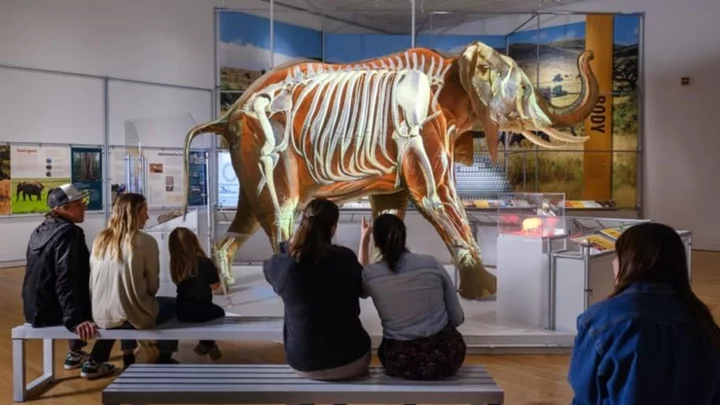
Czech News Crew Robbed While Filming in San Francisco for APEC Summit
San Francisco’s push to use a major international conference to reverse its image as a city in decline
2023-11-14 21:47

‘Tableclothwise,’ ‘Parrotwise,’ and 10 Other ‘-Wise’ Words That Never Caught On
You think you’ve seen every category of words … then you find this batch, including such oddities as tableclothwise and rabbitwise.
2023-11-14 21:19

People crave comfort food more during the winter season
People will be spending 30 per cent longer in the kitchen this winter compared to the summer months – as they crave comfort foods to keep them warm. A study of 2,000 adults who cook at home found they anticipate spending 72 hours rustling up meals from December to February, but just 55 hours from June to August. And 40 per cent spend more time cooking in the cooler months than they do during any other season. Among the reasons for this upward trend are a craving for more hearty, comforting dishes (65 per cent), wanting to feel warm and cosy (42 per cent), and the kitchen being the warmest room in the house (32 per cent). It also emerged 51 per cent are concerned about the impact more time spent in the kitchen will have on their household bills. As a result, 79 per cent are keen to learn more energy-efficient recipes. The research was commissioned by Smart Energy GB, which has teamed up with Michelin-trained chef, Poppy O’Toole, dubbed TikTok’s ‘Potato Queen’, who has crafted a selection of energy-efficient recipes and hacks She said: “Winter is one of my favourite seasons when it comes to the wealth of hearty, comforting recipes you can create - especially if they include potatoes. “And when the weather is colder and the days shorter, what better way to spend time than cooking your favourite winter warmers? “These dishes can take more time and energy to make, which is why I’m excited to show it doesn’t always have to be this way. “I’ve developed a recipe range of energy efficient takes on classic favourites - all with the help of a smart meter.” The study also found 25 per cent of those with a smart meter plan to monitor their in-home display more carefully during the winter. Of those, 42 per cent are doing so because it gives them a greater sense of control over their household bills, while 40 per cent want to reduce their energy use when cooking. One in five of all adults are searching for more cost-saving cooking methods, and 77 per cent said being mindful about energy use when cooking is important to them. It also emerged the typical home cook will use their oven for the equivalent of nearly three days (64 hours) from December to February, and their hob for nearly two days (46 hours). This amounts to at least £18 in energy usage in the kitchen alone between December and February, according to data from Smart Energy GB and Energy Saving Trust. A traditional roast, shepherd’s pie and sausage and mash are among the most popular meals made when then temperature plummets. The study, conducted via OnePoll, also found 39 per cent are using more kitchen appliances in their cooking endeavours than ever before. The oven was voted the top winter appliance of choice (43 per cent), with the economical air fryer (27 per cent) also featuring in the top 10. Victoria Bacon, director at Smart Energy GB, said: “As we head into the colder, winter months where many people spend more time in the kitchen, small changes to the way we cook can make a tangible difference to the amount of energy that’s used. “Smart meters are installed at no extra cost by your energy supplier and come with a handy in-home display which allows you to track your usage in near-real time. “These warming recipes created by Poppy are the perfect thing to help households rustle up hearty dish, while keeping an eye on energy use.” Read More Watch live as gun salutes mark King Charles III’s 75th birthday Woman defends her $7,000 cheese board How to host a dinner party for under £2 per portion Man shows the increase in grocery prices since 2019 Starbucks customer reveals comical result of her request for half sandwich Waitrose Christmas advert features Graham Norton cameo at kid-free festive party
2023-11-14 20:15

Yoga may reduce seizure frequency in epilepsy patients, scientists claim
Doing yoga may help reduce frequency of seizures in people with epilepsy and lower their anxiety, a new study found. The practice may also improve patients’ overall quality of life by reducing the stigma they feel from having the disease, according to the research, published last week in the medical journal Neurology. “People with epilepsy often face stigma that can cause them to feel different than others due to their own health condition and that can have a significant impact on their quality of life,” study author Manjari Tripathi from All India Institute of Medical Sciences (AIIMS) in New Delhi said. “This stigma can affect a person’s life in many ways including treatment, emergency department visits and poor mental health,” Dr Tripathi explained. In the study, researchers assessed people with epilepsy with an average age of 30 in India. They measured stigma among participants based on their answers to questions such as: “Do you feel other people discriminate against you?” “Do you feel you cannot contribute anything in society?” and “Do you feel different from other people?” About 160 people who met the criteria for experiencing stigma were then identified. These patients had an average of one seizure per week and on average took at least two anti-seizure medications, researchers said. One set of patients were then randomly assigned to receive yoga therapy, which included exercises in loosening muscles, breathing, meditation and positive affirmations. Another set of patients received a sham therapy that mimicked the same exercises, but these participants were not given instructions on two key components of yoga – slow and synchronized breathing, and attention to the body movements and sensations. Both the groups received seven supervised group sessions of 45 to 60 minutes over three months. They were also asked to practice sessions at home at least five times a week for 30 minutes and track their seizures and yoga sessions in a journal. Participants were then followed for an additional three months after their first three months of therapy. People who did yoga were more than four times as likely to have their seizure frequency more than halved after six months than the people who did sham yoga, the study found. Compared to those who did the sham practice, participants who did yoga were more likely to reduce their perceived stigma of the disease, researchers say. People who did yoga were also over seven times more likely to no longer have seizures than those who did the sham practice, according to the study. Researchers also reported a significant decrease in anxiety symptoms among those who did yoga versus people who did not. “The intervention group showed significant improvement in symptoms of anxiety, cognitive impairment, mindfulness and quality of life relative to the control group at the end of follow-up period,” researchers wrote. “Yoga may not only help reduce stigma, but also improve quality of life and mindfulness. Plus, yoga can be easily prerecorded and shared with patients online using minimal resources and costs,” Dr Tripathi said. Citing the main limitation of the study, researchers said the participants self-reported their seizure frequency and they may not have remembered all the information accurately. However, they say the findings “elevate the need to consider alternative therapies and activities for people with epilepsy facing stigma”. Read More Jonnie Irwin says he ‘never thought’ he’d be alive to see his 50th birthday Billy Connolly shares health update on Parkinson’s disease: ‘Every day gets stranger’ What are the symptoms of Parkinson's disease and how can it be treated? Jonnie Irwin says he ‘never thought’ he’d be alive to see his 50th birthday Billy Connolly shares health update on Parkinson’s disease: ‘Every day gets stranger’ What are the symptoms of Parkinson's disease and how can it be treated?
2023-11-13 12:55

Jonnie Irwin says he ‘never thought’ he’d be alive to see his 50th birthday amid terminal cancer diagnosis
TV star Jonnie Irwin has admitted that he “never thought” he’d be alive to see his 50th birthday, which is next week. Irwin, 49, who is best known for presenting property TV shows A Place in the Sun and Escape to the Country, was diagnosed with terminal cancer in 2022. In January, Irwin threw an early 50th birthday party, ahead of the actual date next week, with a huge part with 170 friends and family. But in a new interview, the presenter has said he will be jetting off on holiday to Spain with his family for his actual birthday. “I never thought I’d be here,” Irwin told The Sun. “I’m really looking forward to some time with [wife] Jess and the boys.” Irwin shares three young sons with his wife, Jessica Holmes. He has been praised for his transparency about his condition, and his experiences with various cancer treatments. Since his diagnosis, Irwin has followed a strict diet and spends one to two hours a day in an O2Worx hyperbaric oxygen tent. Some studies have shown that flooding the body with oxygen does not promote tumour growth and has been linked to preventing cancer growth. In July this year, Irwin discussed his “really good” experience with palliative care, which focuses on improving the quality of life for anyone facing a life-threatening condition. Irwin said that he has been in palliative care since the day he received his terminal cancer diagnosis. He was first diagnosed with lung cancer in August 2020, but only publicly shared the news in November 2022 after the cancer spread to his brain. His hospice experience was a “delight”, Irwin said, challenging his initial perception that such facilities were “very much a boiling hot room full of people who looked frail and towards the end of their days”. In September, the presenter made his long-awaited return to TV when he hosted a new episode of Escape to the Country on BBC One. Looking back at his time in a hospice six months ago, Irwin said he was “on the cusp of death”. “Lying in the hospice, I thought I’d had it,” he told The Sun. ​​“But at my weakest point I thought, ‘This is it, this is the beginning of the end.’” ​​Irwin returned home and resumed his strict diet, drinking protein shakes and spending time in the oxygen tent to attempt to curb the growth of his cancer. “I won’t let cancer define me,” Irwin told the publication from his newly renovated home in Newcastle. “A friend of mine told me, ‘Your body achieves what your mind achieves’, and I want to live by that.” Read More Jonnie Irwin jokes he’s ‘whacked’ after attending The Streets gig in Newcastle Billy Connolly shares health update on Parkinson’s disease: ‘Every day gets stranger’ What are the symptoms of Parkinson's disease and how can it be treated? Billy Connolly shares health update on Parkinson’s disease: ‘Every day gets stranger’ What are the symptoms of Parkinson's disease and how can it be treated? Tracey Emin says she ‘totally accepted death’ following cancer diagnosis
2023-11-13 00:29

Explore the Secret World of Elephants With the American Museum of Natural History’s New Exhibition
A new exhibit coming to the American Museum of Natural History in New York City examines elephants’ past, present, and future.
2023-11-12 21:55

What’s the Kennection? #88
All five answers to the questions below have something in common. Can you figure it out?
2023-11-12 21:46

Iceland earthquakes: What are your rights if you are on holiday or are planning to go?
The earth is at its most restless in Iceland right now. The Reykjanes peninsula, southwest of Reykjavik, is seething with seismic activity sparking hundreds of small earthquakes. The town of Grindavík, just 10 miles south of Keflavik International Airport, has been evacuated as a precaution. Yet flights are continuing to arrive and depart as normal. These are the key questions and answers on consumer rights. I am in Iceland. Will I be able to leave? Yes, assuming the international airport remains open. So far operations have been normal. There are 14 arrivals and departures planned for Saturday from and to the UK, with no signs of disruption to flights. You may be keen to leave earlier than booked, in order to guarantee your getaway, but at present you will not be able to switch flights without paying a penalty. A spokesperson for British Airways told The Independent: “Our flights are operating as planned and we continue to monitor the situation closely. “We will be in touch with customers directly should the situation change.” The easyJet statement is very similar: “Our flying schedule is currently operating as normal however we are monitoring the situation closely and should this change we will contact customers directly to advise on their flights.” But didn’t an Icelandic volcano shut down European aviation for a week? Yes. Travellers may remember where they were March 2010, when the Icelandic volcano Eyjafjallajökull erupted. The skies of northern Europe completely closed to passenger aviation for almost a week because of fears that volcanic ash spreading southeast from Iceland could damage aircraft engines and endanger travellers. More than 50,000 flights, with eight million passengers booked to travel, were cancelled. So far in 2023, though, ash has not been an issue in the current geological outburst. What if I am booked on a package holiday? Foreign Office advice stops well short of advising against travel to Iceland, meaning holiday companies can continue to operate as normal – with no automatic right to cancel. The Foreign Office advice to British travellers is that it is “increasingly possible” that a volcanic eruption could occur. The official warning on “volcanic eruption and earthquakes” reads: “Earthquakes and indications of volcanic activity have increased above normal levels on the Reykjanes peninsula, southwest of Reykjavik. “The Icelandic authorities continue to monitor the area closely, particularly the area northwest of Mt Thorbjörn near the Svartsengi power plant and the Blue Lagoon. On 10 November, a Civil Protection Alert was declared after an intense swarm of earthquakes. “The town of Grindavík was evacuated as a precaution. Some roads have been closed and visitors are advised to stay away from the area. “Keflavik International Airport is operating as normal. While there is no current eruption, it is increasingly possible that one could occur.” Until and unless the Foreign Office warns against travel, the assumption is that everything will go ahead as normal. The one exception is for holidaymakers who had planned to stay at the Blue Lagoon – an increasingly popular “wellness” destination, with an upmarket hotel on the site. The Blue Lagoon is currently closed. Only those booked for a stay have the chance to cancel; if you were hoping to pop in as a day visitor for a steamy stop in the volcanic rock pools, you will need to return at some time in the future. Can I claim on insurance? No, unless it is one of the vanishingly rare “cancel for any reason” policies. On standard travel insurance, “disinclination to travel” is not an acceptable reason for a claim. Would you go to Iceland at the moment? Yes, I would relish the opportunity. Late November is an excellent time to visit Iceland for good value. Conditions right now are also excellent for the prospect of a good show to the Northern Lights, which are at a peak of the usual 11-year cosmic cycle. I also know that the Icelandic authorities are expert at handling seismic events, with extremely good monitoring and emergency systems in place. I would book a package holiday, though, knowing that if the earth gets too restless for comfort in the vicinity, I would be able to cancel for a full refund. Read More Iceland earthquakes: Your rights if you are on holiday there or are planning to go Iceland earthquakes: Are flights still running amid fears over volcano eruption? In the Superloop: London’s southbound express bus In the Superloop: London’s southbound express bus Airbnb rules go ‘step too far’ with guidance on how to clean up blood Passenger claims tequila in his luggage came back with ‘shot’ missing after flight
2023-11-12 17:28

Stede Bonnet, the Real-Life ’Gentleman’ Pirate Who Inspired ’Our Flag Means Death’
Centuries later, Stede Bonnet’s motivations and actual aptitude for piracy remain unclear. But he still managed to make the history books—in his nightgown, no less.
2023-11-12 01:17

Obesity drug Wegovy cut risk of serious heart problems by 20%, study finds
A new large study finds that the popular weight-loss drug Wegovy reduced the risk of serious heart problems by 20% in certain patients
2023-11-11 22:21

What are the symptoms of Parkinson’s disease and how can it be treated?
Parkinson’s disease is the world’s second most common neurodegenerative disorder, behind Alzheimer’s disease. While it’s unknown exactly why people develop the condition, according to Parkinson’s UK, experts believe its a combination of genetic and environmental factors that contribute to the damage of nerve cells in the brain. So what are the symptoms of Parkinson’s disease and how can it be treated? Here’s everything you need to know. What is Parkinson’s disease? Parkinson’s disease is a degenerative neurological condition. This means that over time the brain of an individual living with the disease becomes more damaged, the NHS explains. A person living with Parkinson’s disease doesn’t have enough of the chemical dopamine in their brain, the Parkinson’s Foundation states. Dopamine is responsible for transmitting signals between nerve cells in the brain. When an individual experiences a loss of nerve cells in the brain, this causes a reduction in the quantity of dopamine in the brain. What are the symptoms? The main symptoms of Parkinson’s disease include involuntary shaking (otherwise known as tremors), movement that’s slower than usual and stiffness in the muscles, the NHS outlines. Other symptoms may include difficulty balancing, nerve pain, incontinence, insomnia, excessive sweating, depression and anxiety. For more information about the symptoms of Parkinson’s disease, visit the NHS here. How many people does it affect? Around 145,000 people in the UK are affected by Parkinson’s disease, Parkinson’s UK explains. This means that around one in every 350 adults is living with the degenerative condition. According to the NHS, symptoms of Parkinson’s usually develop after the age of 50. However, for every one in 20 people affected by the disease, symptoms may appear when they’re under the age of 40. The Parkinson’s Foundation outlines that men are 1.5 more likely than women to be affected by the condition. High-profile individuals to have been diagnosed with Parkinson’s include former US president George H. W. Bush, Back to the Future star Michael J. Fox and The Chase star Paul Sinha. How can it be treated? While there is no known cure for Parkinson’s disease, symptoms may be controlled through treatment. The most common form of treatment used for the condition is medication, Parkinson’s UK states. “Drug treatments aim to increase the level of dopamine that reaches the brain and stimulate the parts of the brain where dopamine works,” the charity explains. The medication used to treat Parkinson’s disease varies according to each patient. This is because as symptoms of the disorder progress, the drugs used to treat the condition may need to be changed. While drug treatment may help to manage Parkinson’s symptoms, it cannot slow the progression of the disease. The NHS explains that those living with Parkinson’s disease may also undergo physiotherapy, occupational therapy, and, in rare cases, brain surgery to treat the condition. For more information about Parkinson’s disease, visit Parkinson’s UK. Read More What are symptoms of coronavirus – and where has it spread? Latest travel updates as coronavirus continues to spread Can face masks really protect you against coronavirus or flu? The dirty truth about washing your hands Billy Connolly shares health update on Parkinson’s disease: ‘Every day gets stranger’ Tracey Emin says she ‘totally accepted death’ following cancer diagnosis Nicky Hilton calls out critics who made negative comments about nephew Phoenix’s head
2023-11-11 21:28

Billy Connolly shares health update on Parkinson’s disease: ‘Every day it gets stranger and more different’
Billy Connolly has said that every day spent living with Parkinson’s disease “gets stranger”, as he shared an update on his health. The Scottish actor, 80, has been living with the condition since 2013, and said that the symptoms and lifestyle impacts of the disease often “creep up” on him. Parkinson’s is a brain disorder that causes unintended or uncontrollable movements, such as shaking, stiffness, and difficulty with balance and co-ordination. Often, the disease can become more severe over time. “Every day it gets stranger and more different,” the retired stand-up comedian told The Times. Connolly said that his newfound love for making drawings, painting and sculptures has helped him navigate the mental health toll of living with the condition. “I don’t know how I would have coped without drawing. It’s taken me out of the scene and put me somewhere else, where I can survey it from a different angle,” he said. “Art has made my life magical at a time when I thought it would be unbearable.” It’s been a decade since Connolly received his Parkinson’s diagnosis. The comedian was walking through the lobby of a Los Angeles hotel in 2013 when a fellow guest, a doctor, stopped him and said he shows physical signs of Parkinsons. This prompted Connolly to visit his doctor. “I’ll never forget what he said: ‘You have the gait of a Parkinson’s man,’” Connolly told the publication. According to Parkinson’s UK, Bradykinesia, which is a common condition among people with Parkinson’s, means slowness and a reduced range of movement when walking. It can make your steps smaller and it can take more time and effort to get around. When Connolly received his official diagnosis, he was also diagnosed with prostate cancer and gallstones in the same week. “It was a helluva week,” he said. “It got funny. My daughter Scarlett was with me in the ambulance on the way to the gallbladder surgery through Manhattan. The sirens were going – nee-naw nee-naw – and she said to me, ‘Is this your first Caribbean cruise?’ That’s a line I always said to her to make her laugh when her surroundings were awkward or boring.” During an interview published in September, it was revealed that Connolly had suffered “a couple of serious falls” and once broke his hip as a result of deteriorating balance. He no longer drives. Despite these growing physical challenges, the What We Did on Our Holiday star maintains a positive outlook on his health. In his memoir, Rambling Man: Life on the Road, which was released earlier this year, Connolly clarified that he doesn’t feel “close to death”. “You see, reports of my recent demise have been greatly exaggerated,” he stated in an extract shared with The Telegraph. “There was a week a few years ago where on Monday I got hearing aids, Tuesday I got pills for heartburn, and Wednesday I received news that I had prostate cancer and Parkinson’s disease. But despite all that, I never ever felt close to dying.” Rambling Man: Life on the Road is available now. Read More What are the symptoms of Parkinson's disease and how can it be treated? Tracey Emin says she ‘totally accepted death’ following cancer diagnosis Nicky Hilton calls out critics who made negative comments about nephew Phoenix’s head What are the symptoms of Parkinson's disease and how can it be treated? Tracey Emin says she ‘totally accepted death’ following cancer diagnosis Nicky Hilton calls out critics who made negative comments about nephew Phoenix’s head
2023-11-11 21:18
